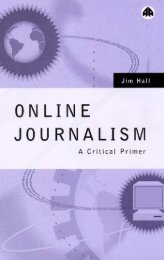Modul Mata Kuliah Journalisme Online - Ayo Menulis FISIP UAJY
Modul Mata Kuliah Journalisme Online - Ayo Menulis FISIP UAJY
Modul Mata Kuliah Journalisme Online - Ayo Menulis FISIP UAJY
You also want an ePaper? Increase the reach of your titles
YUMPU automatically turns print PDFs into web optimized ePapers that Google loves.
For starters, it could imperil your ability to continue to report the story accurately and fairly. If you<br />
express a bias on a topic, your sources of information may change the way they respond to your<br />
inquiries, and your readers may doubt the accuracy of future stories. Your expressions of bias will<br />
not be forgotten quickly.<br />
What are the risks of "unedited journalism" -- live Web discussions, TV appearances, radio hits, etc.?<br />
Just the nature of these other forums makes it a slippery slope for "objective" journalists. You will<br />
likely be pressed by an interviewer, a reader, etc., because they want to know your opinion.<br />
Beware: Expressing an opinion on a topic you're covering -- otherwise objectively -- runs the risk of<br />
compromising your reporting and/or relationship with your sources. Yes, journalists have opinions<br />
on the stories they cover, but good journalists are defined by their ability to not let their opinions<br />
interfere with their coverage of the story. They are guided by the principle of independence.<br />
Should journalists be allowed to keep personal blogs?<br />
Yes, but journalists who work for journalistic organizations should acknowledge that role. They should<br />
also recognize their responsibility to the organization, and review the plans for the blog with an editor,<br />
so that any potential conflicts can be discussed. It's always best to operate on the premise of "no<br />
surprises" for your editor or your organization -- or your readers.<br />
Is it ever appropriate for a reporter to write anonymously on someone else's blog or site? Is it<br />
appropriate for a reporter operate a blog under an alias?<br />
No. Professional journalists should not write or comment on other blogs anonymously or run an<br />
anonymous blog. Reporters are expected to own responsibility for their work, and commenting or<br />
blogging anonymously compromises that core principle. If a reporter believes that some anonymity<br />
of similar tactic is required -- possibly as part of a reporting assignment or a restaurant review -- the<br />
strategy should be used carefully and in consultation with an editor. And if you decide it is<br />
appropriate, consider the plan for eventual disclosure and transparency. This same rule applies to<br />
any "journalist": bloggers, editors, photographers, etc.<br />
Do we need to differentiate between opinion blogs and news blogs?<br />
Remember that a "blog" is only a medium. It's what you do with it that matters. News organizations<br />
should differentiate clearly between opinion blogs and news blogs. Though they may share a<br />
format, the driving force behind clear labeling is the content of the journalism, not the format.<br />
News organizations should articulate clear standards and labeling for all of their news and opinion,<br />
whether it's on a printed page or in a blog.<br />
Can opinion journalists/bloggers do straight news reporting?<br />
It may, at times, be impossible to avoid having commentators do straight reporting; consider the<br />
columnist or editorial writer who happens upon the scene of a breaking news story. But beware of<br />
situations where the coverage involves a topic on which the commentator has already opined. The<br />
opinions could compromise -- in fact or in perception -- the reporter's independence. Again,<br />
transparency and disclosure can be effective strategies in a crucial moment.
















